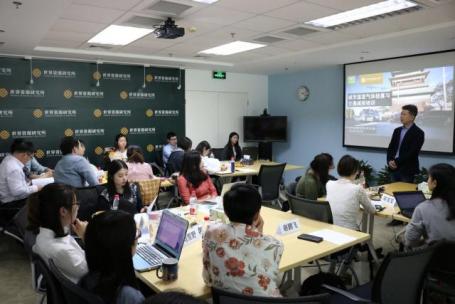WRI and C40 Co-Host Training on GHG Accounting and Transport-Related Emission Reduction for Chinese Cities

With the support of the Children’s Investment Fund Foundation and the Hewlett Foundation, the C40 Cities Climate Leadership Group (C40) and the World Resources Institute (WRI ) co-hosted the Training on City-Level GHG Accounting and Transport-Related Emission Reduction in Beijing from April 11th to 13th to help cities understand the requirement of the Global Protocol for Community-Scale Greenhouse Gas Emission Inventories (GPC). The training provided technical support for cities to explore emission peaking pathways especially in the transport sector, and discussed policy making concerning transport-related energy conservation and emission reduction from the angle of cost effectiveness. Over 20 representatives from government departments, public institutions and research institutes in transport, environment and energy sectors from C40 member cities, including Beijing, Guangzhou, Wuhan, Nanjing, Qingdao and Hangzhou, attended the training.
“Developing city-level GHG inventories is the cornerstone of low-carbon research and actions. As an international standard, GPC is a benchmark which makes the cities' quantitative findings comparable.”said XIE Pengfei, Deputy Regional Director for East Asia of C40, “C40 has carried out the City-Level GHG Accounting and Planning Technical Assistance Program in more than 60 cities across the world to help cities develop GHG inventories in line with GPC standard, and set emission reduction goals and action plans accordingly. In China, we work with WRI to provide technical support for cities to develop GPC inventories and study on emission peaking pathways. With these efforts, we hope to help cities take stock of their carbon emissions and explore the best peaking pathway.
Now over 70 cities in China have announced emission peaking goals, and many cities have carried out peaking-related research. WRI Beijing Chief Representative Dr. LI Lailai said, “It is urgent for Chinese cities to conduct in-depth research at the industrial level. Experience of developed countries shows that emissions from industry, buildings and transport will account for one third of total urban emissions respectively. However, today, transport sector is only responsible for 10% of urban emissions in China. Therefore, transport sector will certainly grow into a major emitter and will be a priority for emission control.” Dr. LI Lailai also said, “Cities have to overcome the following obstacles in order to peak urban transport-related emissions: first, the contradiction between the demand of production, living and transport and emission reduction; second, the uncertainties of the transport sector, including technological advancement, and third, the separation of industry- driven actions and urban administration.
WRI China Sustainable Cities and Transport Program Director LIU Daizong said, "Apart from making important contribution to peak emissions, urban transport also plays a vital role in air pollution control. In some cities, vehicles have become a primary source of PM 2.5 with contribution amounting to 20% to 40%. The revised Law on the Prevention and Control of Atmospheric Pollution requires simultaneous and balanced control of transport-related GHG and air pollutant emissions, under which we can not only meet the dual goals of reducing carbon intensity and cutting pollutant discharge , but also improve energy efficiency, environment, public health and social benefits, as well as avoiding the cost of implementing pollutant and GHG emission reduction laws and policies separately.
During the training, representatives also visited Beijing Transport Energy Conservation Statistics and Monitoring Platform at the Beijing Transport Institute and engaged in in-depth discussions.
GPC is the first global city-level GHG emission accounting and reporting standard launched by WRI in partnership with C40 and Local Governments for Sustainability (ICLEI). This training is part of the training series under the City-Level Accounting and Planning Technical Assistance Program jointly initiated by C40 and WRI. A number of capacity-building events have been held in Beijing, Wuhan, Guangzhou and Shanghai with positive feedback. Going forward, we will continue to host similar events to promote inter-city communication and help cities play an important role in addressing climate change.